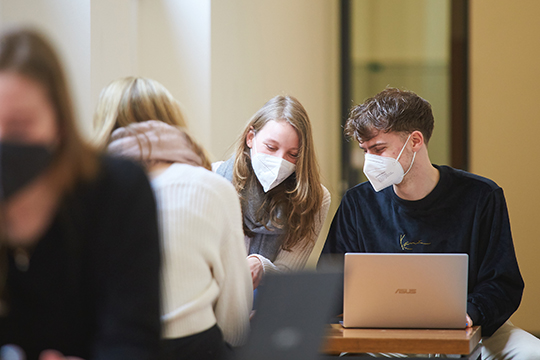“Digital Interdisciplinary Mini-Academy” for Ukrainian and University of Freiburg Students
Freiburg, Sep 08, 2022
The aim of the DIMA project at the University College Freiburg (UCF) is to use digital technology to bring students and teachers in and outside of Ukraine and in Freiburg together. DIMA stands for “Digital Interdisciplinary Mini-Academy.” The concept is being supported financially by the German Academic Exchange Service (DAAD). The University of Freiburg and two partner universities in Ukraine have organized a wide-ranging offering of mainly English-language online courses. They will be held from October to December 2022.
 Online courses, organized by the University of Freiburg and two partner universities in Ukraine, offer an additional qualification to students who are unable to study or have only very limited study time because of the war against Ukraine. Photo: Harald Neumann
Online courses, organized by the University of Freiburg and two partner universities in Ukraine, offer an additional qualification to students who are unable to study or have only very limited study time because of the war against Ukraine. Photo: Harald Neumann
Medical ethicist Dr. Svenja Wiertz is one of DIMA’s coordinators. She says, “The digital offering has been conceived as an additional qualification.” It’s directed above all at students of the Ivan Franko National University of Lviv and the National University of Kyiv Mohyla Academy, who because of the war against Ukraine are unable to study at their universities, or only able to study to a very limited extent. “Many of them are fleeing or living under very difficult conditions, such as near the front. What we’ve heard is in some cases shocking,” says Silvia Stößer of University College Freiburg, who is serving DIMA administratively. The DIMA courses are intended to create an additional offering. They are also open to University of Freiburg students. Among them are refugees from Ukraine who are now studying here. In all, there will be around sixty places available, around twenty for each of the three universities taking part.
Methods and interdisciplinary work
“In the online courses, the students will be looking at the basics of interdisciplinary work. They’ll also become familiar with different methods of approach and address current specialist topics that go beyond their own individual areas of study,” says Svenja Wiertz. Among the courses on offer will be an introduction to scientific philosophy, qualitative interview studies, or statistics. But there will also be courses in applied ethics, human rights, security policy, and sustainable urban development. Wiertz explains the concept: “The Mini-Academy will end in an online final conference in December, during which the students will present their projects from course work.”
Digital and international
The program is modeled on the international and interdisciplinary course offering of the University College of the University of Freiburg; some of the courses of the College will be open to the “Mini Academy.” There have already been projects to further develop digital instruction. One of the two project directors, Dr. Stoyan Panov, was already responsible for two DAAD projects known as “DAAD’s International Virtual Academic Collaborations.” Within the scope of these projects, Freiburg, together with partner universities in Poland, Sweden, Denmark, the United Kingdom, and the US offered a range of digital courses on topics such as sustainability management, sustainable cities, and pandemics in history. “These aspects were contained in the DAAD call to tender, so they fit us 100 percent,” says Silvia Stößer. The contact person in Ukraine is Dr. Oksana Holovko-Havrysheva, who teaches European Law in Lviv and Kyiv.
Prof. Dr. Veronika Lipphardt is a project leader in Freiburg, along with Dr. Stoyan Panov, who teaches European and International Law at UCF. Lipphardt is a professor of science and technology studies at UCF. Staff members from Lipphardt’s professorship had already established personal contact students from Ukraine in Freiburg, and the idea for the new project developed from this. Until the end of 2022, the DAAD is supporting the “Digital Interdisciplinary Mini-Academy” with a grant of some 130 thousand euros.
Contacts for new projects
The funds will be used to pay Ukrainian course instructors as well. “And in November and December 2022, we will invite all the DIMA instructors to come to Freiburg for five days. That will be the only “on-site” event of our project,” says Svenja Wiertz. The coordinator continues that there will be a workshop on the topic of digital teaching. Without the opportunities opened by digitization, a project like DIMA would be inconceivable. She emphasizes, “Our university can benefit from it too, because we’re gathering more experiences with interdisciplinary, international, digital learning.” Beyond that, says Wiertz, at the conference there will be many opportunities for instructors from Ukraine and Freiburg to share their experiences.
It’s hoped that new projects will develop from this, even when the “Digital Interdisciplinary Mini-Academy” is planned first as a one-time offering and will finish at the end of December 2022. The aspiration for new projects also applies, of course and especially, to the students taking part, says Wiertz. “Our aim is to get an offering up and running that makes broadening horizons possible in this difficult time and strengthens contact between Ukraine and Germany,” she concludes.
Thomas Goebel

